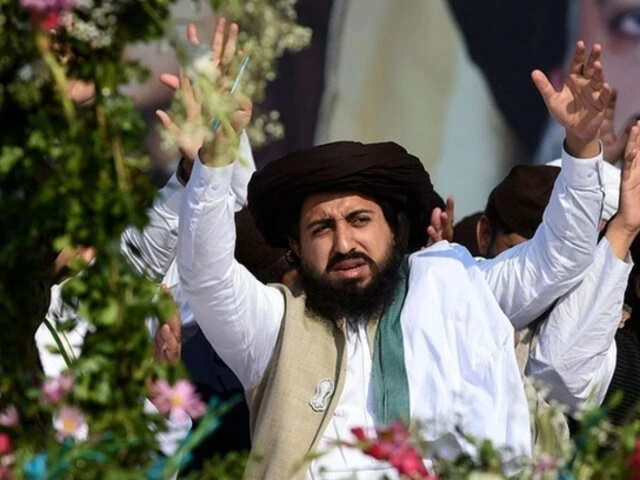The Ministry of the Interior informed the Cabinet about the activities of the religious group and was subsequently ordered to proceed with legal measures.
The federal cabinet, headed by Prime Minister Shehbaz Sharif, approved a ban on Tehreek-e-Labbaik Pakistan under Article 17 of the Constitution, following a recommendation from the Punjab government.
The decision was taken during a cabinet meeting held in Islamabad on Thursday to review the law and order and the group’s recent activities. During the meeting, the cabinet members were briefed about Punjab’s proposal to ban the religious group. The Ministry of the Interior submitted a detailed report on the activities of the TLP and subsequently received formal instructions to proceed with the necessary legal steps.
The meeting, chaired by the prime minister, also reviewed the country’s economic and political situation and discussed developments following the recent ceasefire agreement with Afghanistan.
During the session, Defense Minister Khwaja Asif briefed the cabinet on the details of the Afghan deal, while members also endorsed decisions taken earlier by the Economic Coordination Committee (CEC) and the Cabinet Legislative Affairs Committee.
Punjab proposed center to ban TLP
Last week, the Punjab government had recommended to the Center that a complete ban be imposed on the religious party, whose Gaza March was forcibly dispersed by authorities on October 13 in Muridke.
In a high-level meeting chaired by Punjab Chief Minister Maryam Nawaz, it was agreed that TLP leaders and workers involved in the killing of police officers and destruction of public property will be tried in anti-terrorism courts (ATC).
The Punjab Police claimed that during the Muridke crackdown, TLP protesters resorted to violence which resulted in the death of a Station House Officer (SHO). Forty-eight police and rangers were also injured during the clashes and 17 were injured by gunfire. Three TLP workers and a bystander also lost their lives, while at least 30 civilians were injured.
The TLP had planned to march to Islamabad to protest in front of the US embassy in a show of solidarity with the Palestinians. When police and protesters clashed, protesters set dozens of vehicles on fire.
Following the failure of negotiations, the government cracked down and launched a six-hour operation at 3am in Muridke to disperse the protest. This led to mass arrests, with the TLP claiming the deaths of several workers, including conflicting reports that party chief Saad Rizvi had been shot.
In view of the violence, the meeting decided to place the TLP leadership under the Fourth Schedule of the Anti-Terrorism Act (ATA), 1997. It resolved to hand over all properties and assets of the party to the Auqaf Department and impose a complete ban on its posters, banners and advertisements.
The TLP’s social media accounts will also be blocked. All bank accounts of the party will be frozen and strict action will be taken for any violation of the Speakers Act.
TLP: From the legacy of Khadim Rizvi to the rise of Saad Rizvi
Tehreek-e-Labbaik Pakistan (TLP) has become one of the most prominent political-religious movements in Pakistan in recent years. The party’s roots date back to 2015, when its founder Khadim Hussain Rizvi created it with the primary objective of upholding Pakistan’s blasphemy laws.
Khadim Hussain Rizvi, a fiery cleric known for his impassioned speeches delivered from a wheelchair, quickly gained popularity among Pakistan’s majority Sunni population. His strong oratory skills and uncompromising stance on religious issues made him a central figure in the country’s religious politics.
In November 2017, Rizvi led a long march from Lahore to Islamabad, culminating in the Faizabad sit-in near Rawalpindi. The protest targeted the then Pakistan Muslim League (N) government and its justice minister, accusing them of introducing controversial amendments related to the Khatm-e-Nabuwwat (Finality of Prophethood) oath and protecting the Ahmadi minority.
The Asia Bibi case
In 2018, TLP took to the streets again following the Supreme Court’s decision to acquit Aasia Bibi, a Christian woman accused of blasphemy. The nationwide protests that followed further cemented the TLP’s image as a powerful religious movement.
The same year, the TLP participated in the 2018 general elections and gained enough votes to become Pakistan’s fifth-largest political party, a notable achievement for a newly formed movement.
Death of Khadim Rizvi
In November 2020, Khadim Hussain Rizvi made headlines with a statement in which he threatened to reveal the establishment’s role in the 2017 Faizabad sit-in during his upcoming Friday sermon. However, before he could deliver it, he fell ill (apparently due to COVID-19) and died on November 19, 2020.
After his death, his eldest son, Saad Hussain Rizvi, was elected the new Emir (chief) of the TLP. Saad received his early education at his father’s seminary and quickly gained recognition for continuing his father’s mission with renewed discipline and organizational strategy.
Saad Rizvi and the TLP’s growing political base
Under the leadership of Saad Rizvi, the TLP expanded its political reach, particularly in Punjab. According to a Gallup poll, the party polled 2.89 million votes in Punjab during the 2024 general election, making it the third largest political party in the province. However, the survey also indicated a decline in the TLP’s vote bank in Sindh.
In comparison, the TLP had received 2.2 million votes from Punjab in the 2018 elections, suggesting a clear upward trend in public support during Saad Rizvi’s tenure.
Despite frequent controversies surrounding its protests and hardline stance, the TLP continues to exert significant influence on Pakistan’s religious and political landscape. It remains to be seen whether Saad Rizvi will be able to transform the movement from a street protest force into a sustainable political entity, but the party’s growing vote share indicates its deep and lasting impact on Pakistani politics.




